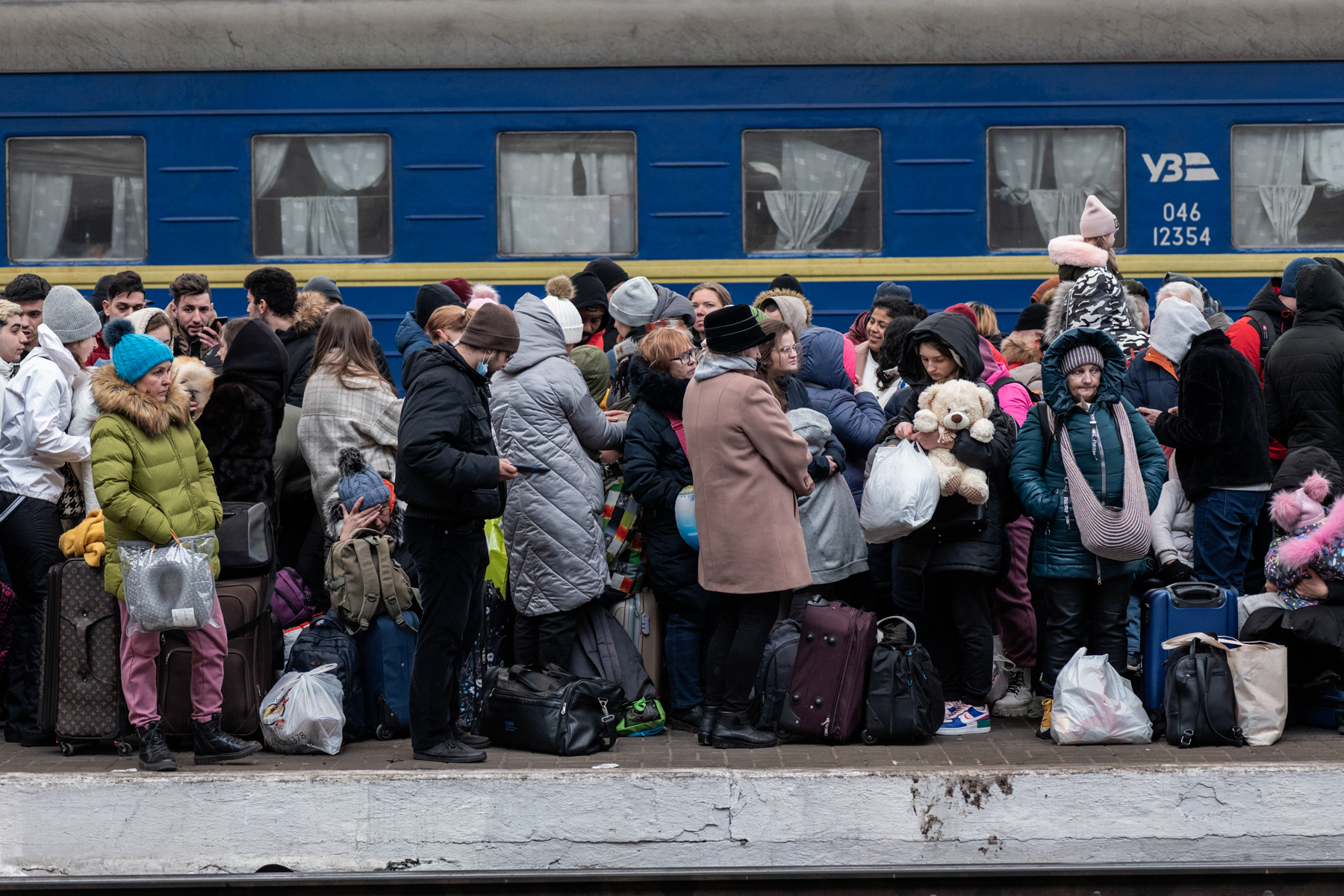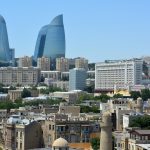Lviv, Ukraine – February 27, 2022: Passengers wait on a crowded platform at the train station in Lviv for a train to the Polish border. The train was scheduled to arrive at any minute but in fact wouldn’t arrive for another ten hours. Photo by Joel Carillet.
ARTICLE BY BILL DIEM
Some of the Ukrainians fighting Vladimir Putin’s Russian army are also French.
When Putin’s threats toward Ukraine increased in seriousness in mid-February, France encouraged its citizens there to leave. As war damage increased after Russia’s invasion began Feb. 24, there was a second wave of emigrants, said Sen. Hélène Conway-Mouret, the senator for French citizens living in other countries. But some French, she said, usually with dual Ukrainian citizenship, “made the choice to stay … and fight.”
France 3 Nouvelle-Aquitaine recounts the story of one such Frenchman, Pascal Boiteux, who has been living for years in Kyiv with his Ukrainian wife and their French-Ukrainian son and daughter. His wife and daughter have sought shelter in France, but his 19-year-old son is required to join the fight.
So dad is staying too, unwilling to leave his son alone. Boiteux told France 3 that his son loves his country and wouldn’t have wanted to leave anyway—all his friends are in the fight and he doesn’t want to look like a coward. Father and son help the war effort however they can, though dad convinced his son not to take up actual arms.
Conway-Mouret told Anthrow Circus that according to the French ambassador, as of this weekend, 100 to 150 French citizens remain in the country, mostly around Odessa. Before Feb. 19, when Ambassador Etienne de Poncins suggested that French people leave, around 1,050 French citizens were registered with the embassy, though it’s estimated there were approximately 1700 in total living in Ukraine. About 1400 indicated they would Leave.
Unified military options
The whole world has been watching Putin’s war. Aside from a few of Russia’s traditional allies and economic partners, the worldwide weight of support is on the side of Ukraine, to the limit possible without causing Putin to push a nuclear button. Putin rattled his nuclear sword early in the invasion, likely in a bid to scare off direct help to the Ukrainian army. But the Ukrainians are fighting back better than, by all accounts, Putin expected.
The big picture, said Conway-Mouret, is that Europe is coming together as a political entity with a shared future. The senator was speaking last Tuesday in a non-descript Paris meeting room in the 13th arrondissement to two dozen journalists belonging to the Anglo-American Press Association and the Association de la Presse Étranger (the Foreign Press Association in France). She was a stand-in for Anne Hidalgo, the Paris mayor running for president in next month’s election.
Hidalgo was supposed to be at the meeting but never showed due to last-minute schedule changes. In her stead Conway-Mouret said Hidalgo favors a European approach to diplomacy, to the problem of refugees, and to cyber defense. She said there should be a European cyber defense agency because “cyber attacks today are so strong that the individual countries of the European Union cannot respond.”
Conway-Mouret said Europe learned a lesson in the 1990s. “Many have forgotten that the last war on the continent was in the Balkans, and Europe, unfortunately, demonstrated its incapacity to react.” The result was civilian deaths amounting to ethnic cleansing.

Sen. Hélène Conway-Mouret at a March 15 meeting with journalists in Paris. Photo by Bill Diem.
Europe has no united military capability of its own, though Emmanuel Macron, France’s current president who is running for a new five-year term, has pushed for years for creation of a “true, European army.”
Many European countries, including France, are already members of NATO, the military alliance established between 28 European countries and the U.S. and Canada in the aftermath of World War II. NATO members agree to mutual defense if one of them is attacked.
Ukraine is not a member of NATO, while other neighboring countries are. NATO would fight Russia if, for example, Poland were invaded, Conway-Mouret said, though in a mid-February diplomatic meeting between France, Germany, Russia, and Ukraine, she insisted that “the military options offer no long-term solution, only diplomacy will permit the countries to arrive at a durable peace.”
Unasked of Conway-Mouret and unanswered in last week’s meeting with journalists is the question of NATO’s response if Putin sends tanks across his shared borders with Latvia and Estonia, former members of the Soviet Union who are now members of NATO and the EU. NATO Secretary General Jens Stoltenberg has however said, “Our commitment to Article 5, our collective defense clause, is iron-clad. We will protect and defend every inch of NATO territory.”
In early March, 500 French troops deployed to NATO member Romania as part of the first ever activation of the NATO Response Force for collective defense and deterrence. According to NATO, “France leads this year’s highest-readiness element of the NATO Response Force, a multinational force comprised of up to 40,000 land, air, maritime and special operations personnel that NATO can deploy on short notice as needed.”
Ukrainian refugees in France
Refugees from Ukraine are pouring into Poland, which has welcomed them, and they are then moving freely within Europe. “Every day the airplanes from Warsaw to Paris are full,” said Sen. Conway-Mouret.
The French ambassador, de Poncins, has stayed in Ukraine to help with the migration. When hostilities began, he moved the embassy from the capital Kyiv, one of Russia’s principal targets, to Lviv, the biggest town in western Ukraine. There has since been shelling in Lviv.
French residents are among the Europeans offering places in their homes to Ukrainians in need of refuge, with homes around France listed on the site Ukraine Take Shelter and communities such as southwestern France’s Pau organizing to assist Ukrainians in various ways.
Conway-Mouret and her candidate favor a European approach to handling the refugees, a lesson that comes from Italy and Greece, which were offered no help for years as they tried to handle a mass influx of Mediterranean-crossing immigrants from war-torn Syria and other countries.
Bill Diem, a graduate of Ohio Wesleyan University and Antioch College, contributes a weekly column to the Newberry News in Michigan, and he is learning to be a video journalist. For three decades, he was a print journalist best known for his coverage of technology and industrial strategy in the global automobile industry.








